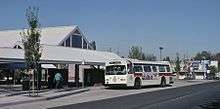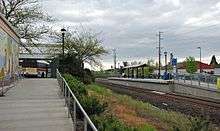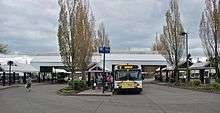Tigard Transit Center
Tigard Transit Center | |||||||||||
|---|---|---|---|---|---|---|---|---|---|---|---|
| WES commuter rail station | |||||||||||
|
| |||||||||||
| Location |
8960 Southwest Commercial Street Tigard, Oregon | ||||||||||
| Coordinates | 45°25′48″N 122°46′10″W / 45.43013°N 122.769547°WCoordinates: 45°25′48″N 122°46′10″W / 45.43013°N 122.769547°W | ||||||||||
| Owned by | TriMet | ||||||||||
| Line(s) | |||||||||||
| Platforms | 1 island platform | ||||||||||
| Tracks | 2 | ||||||||||
| Construction | |||||||||||
| Structure type | At grade | ||||||||||
| Parking | Park & Ride: 100 spaces | ||||||||||
| Disabled access | Yes | ||||||||||
| History | |||||||||||
| Opened | February 2009 | ||||||||||
| Services | |||||||||||
| |||||||||||
Tigard Transit Center (more formally known as the Thomas M. Brian Tigard Transit Center) is a train and bus station in Tigard, Oregon, United States. Operated by regional public transit authority TriMet, the facility opened in 1988 as a bus transit center, and a station for service from the Westside Express Service (WES) commuter rail line was added in 2009. The station is the middle stop of the five-station, 14.7-mile (23.7 km) line that runs from the city of Beaverton in the north to Wilsonville in the south.
History

Tigard Transit Center was designed by Skidmore, Owings & Merrill and opened for buses in 1988,[1] served by about 200 bus trips per day.[2] The design received a commendation from the local chapter of the American Institute of Architects in 1988.[1] The site already had a Greyhound bus station (located in an adjacent storefront), which remained there after the transit center's opening[2] but moved to a location on Main Street in the 1990s.
Plans for a rail connection started as early as 1991 when a proposal for a light rail line was studied, with the transit center as its southern terminus.[1] As of 2009, this line has not been built, but it is still planned with studies to begin as early as 2013.[3]
Plans for the commuter rail service between Beaverton and Wilsonville began as early as 1996.[4] In 2001, the Federal Transit Administration authorized the project, and in 2004 it approved the project.[5] Construction began in October 2006.[6] The line is the first suburb-to-suburb commuter rail line in the United States, and the first commuter rail line in Oregon.[7]
Groundbreaking for the rail station at the center was in December 2006, and was led by Oregon senators Gordon Smith and Ron Wyden.[8] The public artwork at the station was installed on September 3, 2008.[9] The line was opened on February 2, 2009.[10] In 2009, TriMet announced they would add additional bike lockers at the transit center using federal stimulus funds.[11] In May 2011, the transit center was dedicated as the Thomas M. Brian Tigard Transit Center in honor of former Tigard mayor and county commissioner Thomas M. Brian, who had helped make the WES rail line a reality.[12]
Station details

The WES station is one of five on the 14.7-mile (23.7 km) rail line that utilizes Portland and Western Railroad’s freight rail line.[13] Located in downtown Tigard on Commercial Street south of Oregon Route 99W, the station and line are only in operation during the morning and evening commute times from Monday through Friday.[14] The station has 100 parking spaces at its park-and-ride lot and is served by six bus lines.[14] The city allocated $100,000 for refurbishing the existing TriMet-operated bus transit center at the site,[15] which opened in 1988. At the northern terminus, the Beaverton Transit Center, passengers can connect to MAX Light Rail.
Public art at the station consists of an interactive sculpture created by Frank Boyden and Brad Rude.[16] The sculpture features bronze heads and a vehicle designed to represent the train and the variety of people who ride the line.[16] The vehicle moves along a track and has an animal figure displayed in a scene atop the piece.[16] Additionally, the station has a mural along one of the walls.[16]
Bus lines

The transit center is served by the following bus lines:
- 12 – Barbur/Sandy Blvd
- 45 – Garden Home Rd
- 64 – Marquam Hill/Tigard
- 76 – Beaverton/Tualatin
- 78 – Beaverton/Lake Oswego
- 93 – Tigard/Sherwood
- 94 – Pacific Hwy/Sherwood
- Yamhill County Transit Area (YCTA) service to McMinnville[17]
See also
References
- 1 2 3 "SW Portland Home, Vollum Institute receive honor awards of architects". The Oregonian. October 11, 1988. p. B6.
- 1 2 "Construction nears on transfer center for buses in Tigard" (April 6, 1987). The Oregonian (West Metro edition), p. B6.
- ↑ Christensen, Nick (July 11, 2009). "AmberGlen could move up transit list". Hillsboro Argus. Retrieved 2009-07-16.
- ↑ Frost, Danielle (March 24, 2004). "Rail project gets closer to station". Wilsonville Spokesman.
- ↑ "Wilsonville-to-Beaverton commuter train gets OK". Portland Business Journal. May 10, 2004.
- ↑ "TriMet building passenger train line". Portland Business Journal. October 23, 2006. Retrieved 2015-01-12.
- ↑ Jagernauth, David (March 7, 2007). "Wilsonville rail station finally gets on track". Wilsonville Spokesman.
- ↑ Mayer, James (December 11, 2006). "Transit activist is still on the road not taken". The Oregonian. pp. A1.
- ↑ Foyston, John (September 4, 2008). "Ambitious crews install 5 steel sculptures in a day". The Oregonian.
- ↑ Leah Weissman (February 5, 2009). "WES' first day — 'I plan on using it every day'". Beaverton Valley Times. Retrieved 2013-04-20.
- ↑ "Portland TriMet will use stimulus money for bike projects". The Oregonian. March 10, 2009. p. B7.
- ↑ Florip, Eric (May 9, 2011). "Tigard Transit Center dedication honors former Washington County chair Tom Brian". The Oregonian. Retrieved 10 May 2011.
- ↑ Tucker, Libby (March 5, 2007). "Commuter rail project breaks ground in Wilsonville". Daily Journal of Commerce.
- 1 2 "Washington County Commuter Rail Project: Station Locations". TriMet. Archived from the original on 2008-02-06. Retrieved 2008-04-15.
- ↑ "Re-energizing downtowns", The Oregonian, April 10, 2007.
- 1 2 3 4 Public Art on Commuter Rail. TriMet. Retrieved on August 21, 2008.
- ↑ "McMinnville – 99W Link schedule" (PDF). Yamhill County Transit Area. January 18, 2012. Retrieved June 11, 2012.
External links
| Wikimedia Commons has media related to Tigard Transit Center. |
- Tigard Transit Center – TriMet page